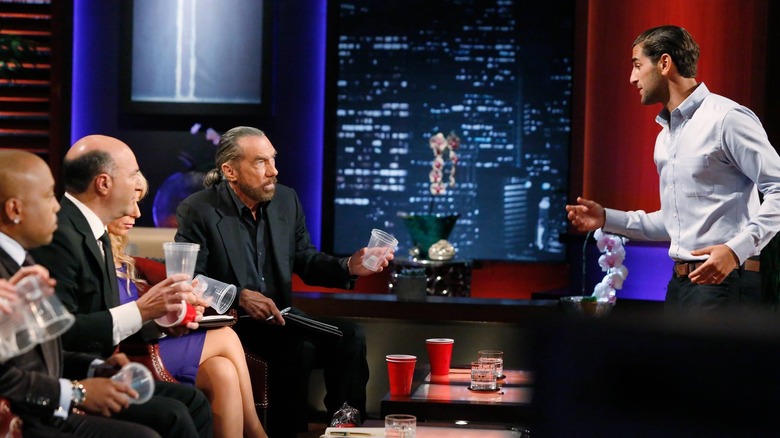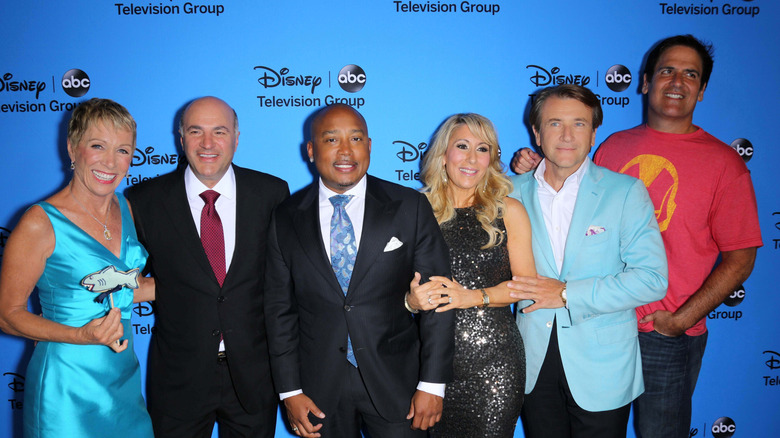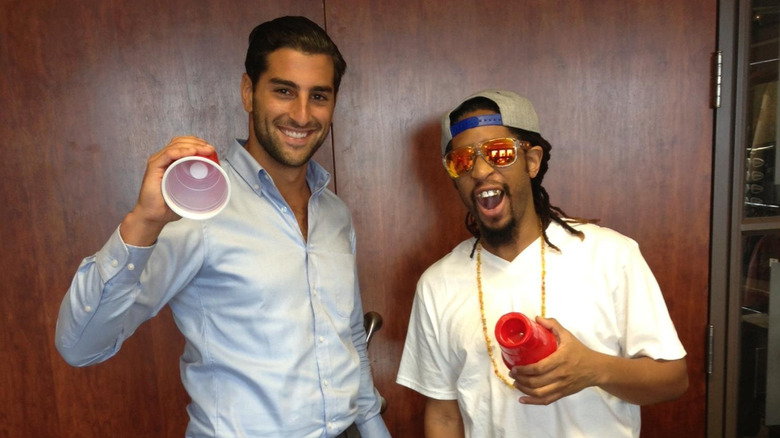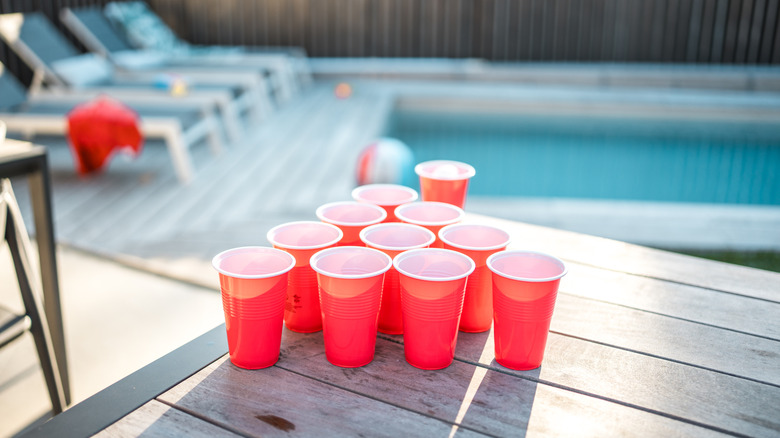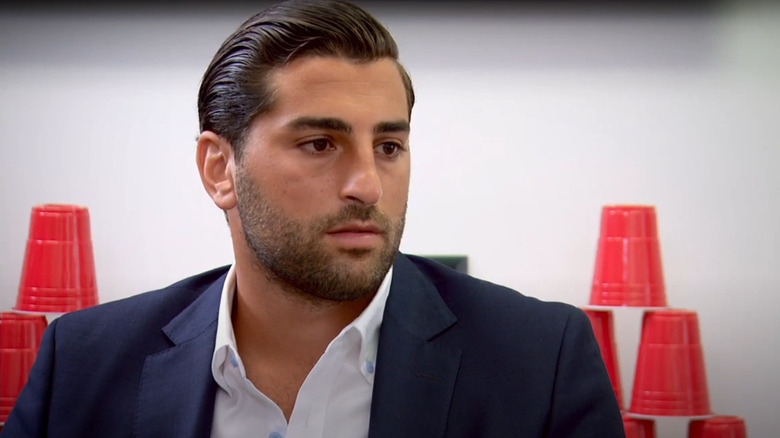180 Cup: Here's What Happened After Shark Tank
Ask any college student and they'd probably see no reason to improve on those 16-ounce red plastic cups that seem to multiply in dorm rooms, frat houses, and college town bars. But Solomon Fallas knew there was potential for the iconic drinkware after attending a frat party at his brother's college. After noticing 200 people using approximately 900 cups, Fallas saw some strong business potential if he flipped the single-purpose cup on its ear. Turn the bottom up of his version, the 180 Cup, and you'd find an indent big enough for a shot glass (which typically has a standard 1.5-ounce pour), container, or measuring cup.
Using social media and Craigslist, Fallas recruited college students to help sell the cups –- for which he received design and utility patents –- to local liquor and grocery stores. When the entrepreneur appeared on "Shark Tank" during the show's fifth season, he said the approach helped him sell five million cups and garner $385,000 in sales in fewer than six months. He sought $300,000 for a 15% stake in his business.
What happened to 180 Cup on Shark Tank?
The "Shark Tank" panel was both surprised and impressed with the 5 million cups 180 Cup sold in its first six months. They also responded well when entrepreneur Solomon Fallas shared that the reorder rate among the 120 mom and pop shops that had bought the cups from college students was 92%. Daymond John wasted no time. He jumped in by offering Fallas the $300,000 for 20% of the company as long as the company founder immediately accepted his deal. Fallas, however, wanted to see if there were any other offers. Mark Cuban questioned whether waiting to accept the deal was a wise choice. Apparently, Fallas' answer was yes; he continued seeking offers from the Sharks, hoping to impress them by noting the company had only tapped 1% of the college market and had still been able to achieve such sales numbers.
Lori Greiner was the first to declare herself out, saying she didn't have a personal connection to the product. A few years later, Greiner would end up investing in another company trying to change the college drinking experience: Night Cap, a reusable, portable drink cover to prevent drink spiking.
Although Cuban liked the sales model Fallas had created with college students, he thought the product was niche and didn't match the founder's valuation. Kevin O'Leary bowed out, and guest Shark John Paul DeJoria, founder of tequila company Patrón and co-founder of Paul Mitchell haircare products, said he didn't feel passionate about the product. Thankfully, John came back in but upped his equity demand to 30%. After some negotiating, the two agreed to 25% of the company and made a deal.
180 Cup after Shark Tank
Sales of the 180 Cup shot up in the months after "Shark Tank." The company took away more than just a deal from "Shark Tank" as well — it redesigned the cups to add small feet to address an issue Lori Greiner had raised: sipping off of something that had been resting on a dirty table. The brand also expanded into new products, coming up with a $3 beer pong set that it sold in Walmart locations nationwide. 180 Cup was featured at Staples in the store's "Shark Tank" section, and it even appeared in a skit on the popular comedy show, "Key & Peele."
Then, in early 2016, Solomon Fallas appeared on an episode of "Beyond the Tank" and noted the company had grown to $4.9 million in sales, was in 15,000 retail outlets in five countries. Despite this, the partnership with Daymond John did not work out. Fallas noted that John had brought in one of his contacts to license the cup's design for a reusable, dishwasher-safe version, but that company had filed for bankruptcy. With a contract still in place, 180 Cup would not be able to make a deal with any other manufacturer. John, meanwhile, was upset that Fallas had turned down a deal to bring in rapper Lil Jon as a brand ambassador. Even though the two found some common ground, they agreed to part ways — thankfully, amicably.
Why did 180 Cup go out of business?
Despite its initial success, by all accounts, 180 Cup is no longer in business. Its website domain is up for sale. The company's last Facebook post was when the "Beyond the Tank" episode aired in 2016, and the company does not appear to have any other social media presence. With no official commentary and no interviews, it's impossible to say precisely what happened.
Clearly, 180 Cup had some stiff competition. The original red plastic cup favored by college students is so iconic that people actually spend time pondering the meaning of its distinctive red lines. There have even been songs dedicated to red Solo cups, with country singer Toby Keith's ode to the cup becoming his top-selling single in 2012. Perhaps 180 Cup would still be in business if Solomon Fallas had gotten someone to create a catchy tune or jingle about his unique product.
What's next for 180 Cup's founders?
A bit of an enigma, Solomon Fallas does not appear to have a LinkedIn profile, and much of his personal Facebook profile, which still lists him as founder and CEO of 180 Cup, is private or inactive. His Instagram page is also private, but a link under his bio connects to the Instagram page for Concrete Construction, a company that does backyard design and home renovation in New Jersey and New York City. The entrepreneur has a Threads account, but to the shock of none, it's private.
At the time of his "Beyond the Tank" appearance, Fallas had gotten married, and he and his wife were expecting their first child. While 180 Cup may no longer be in business, it seems he has found success elsewhere.

